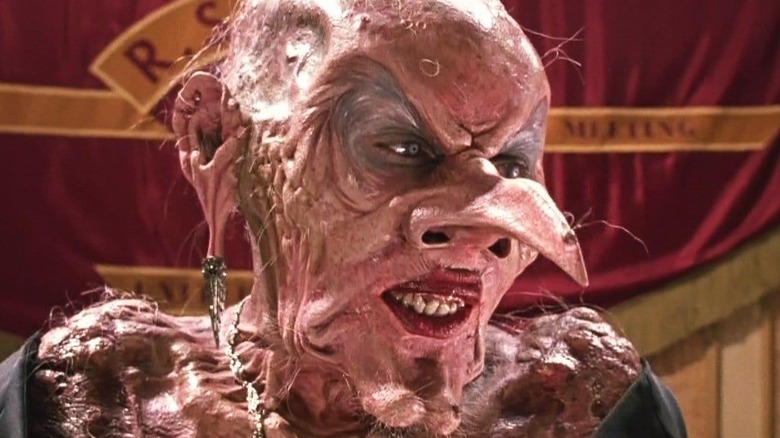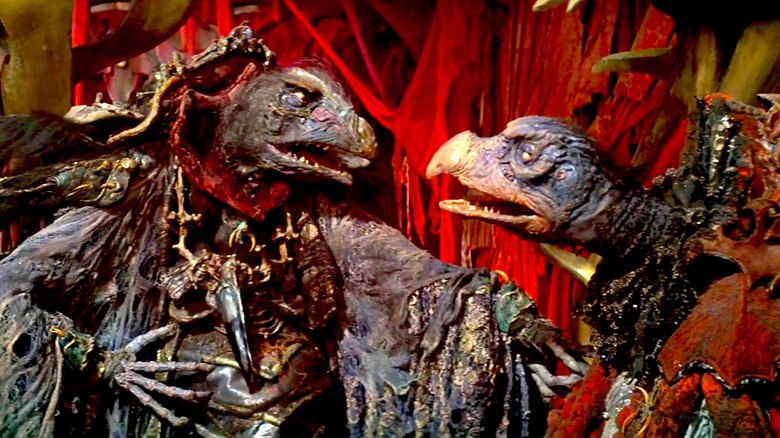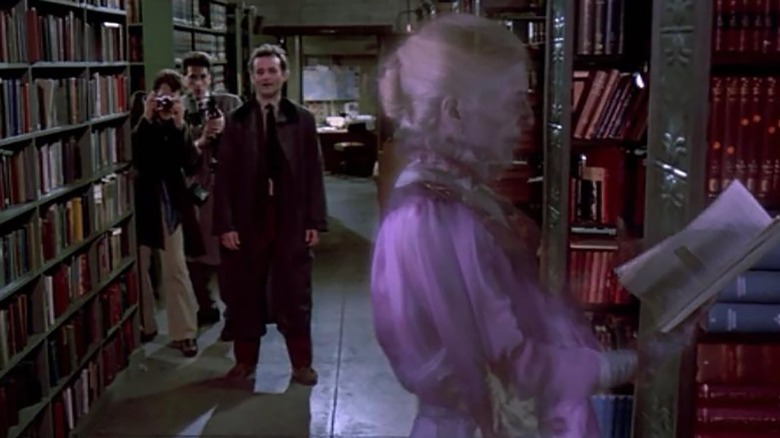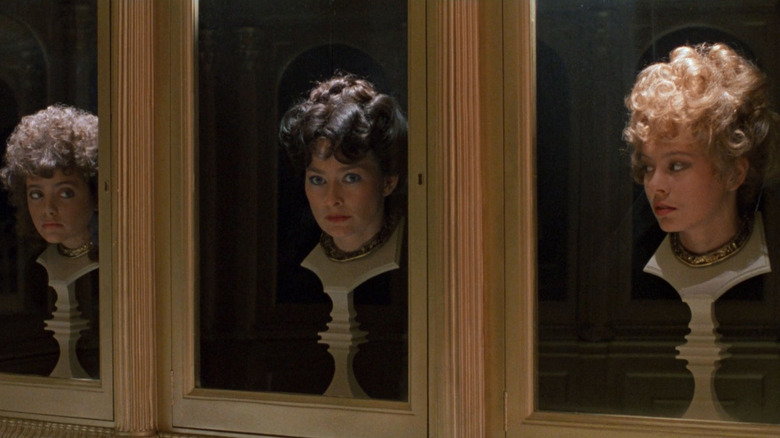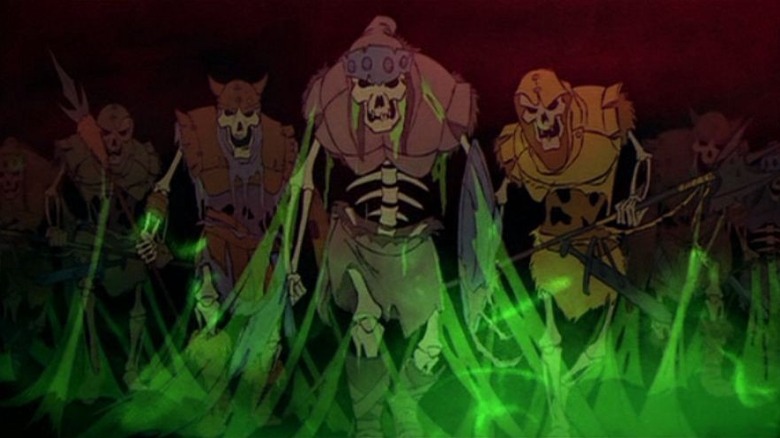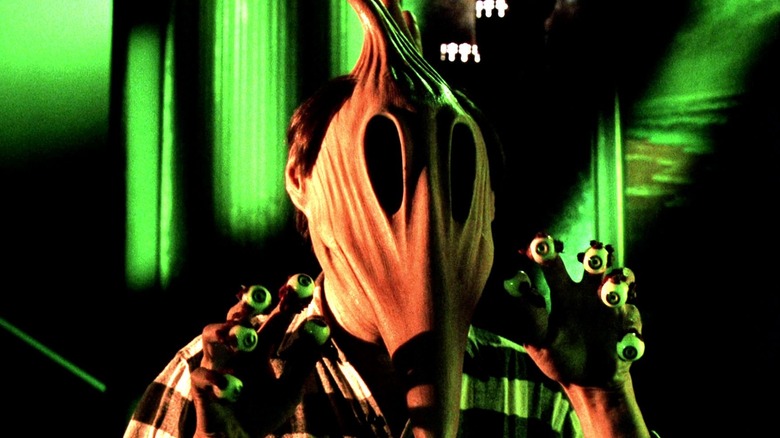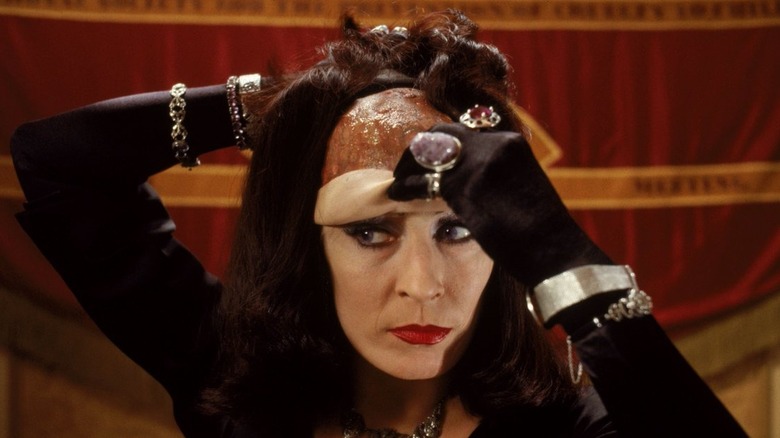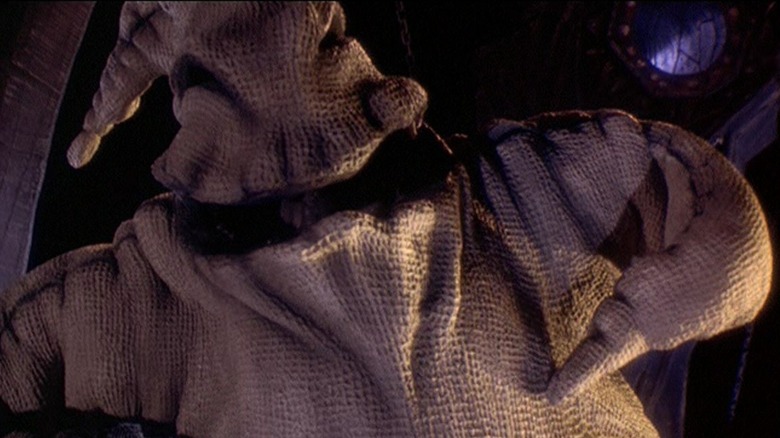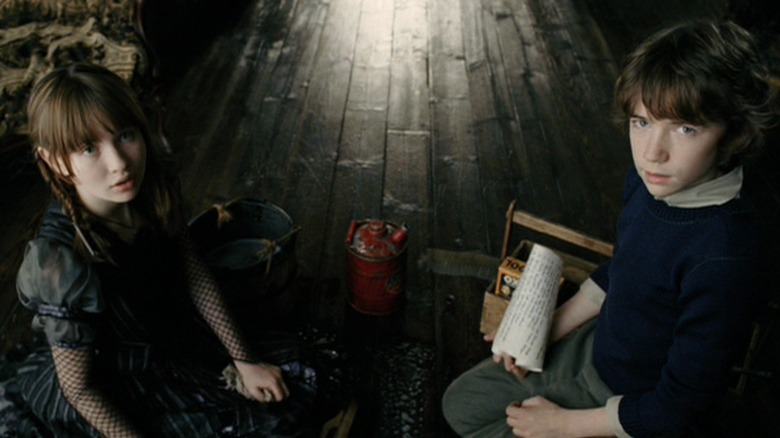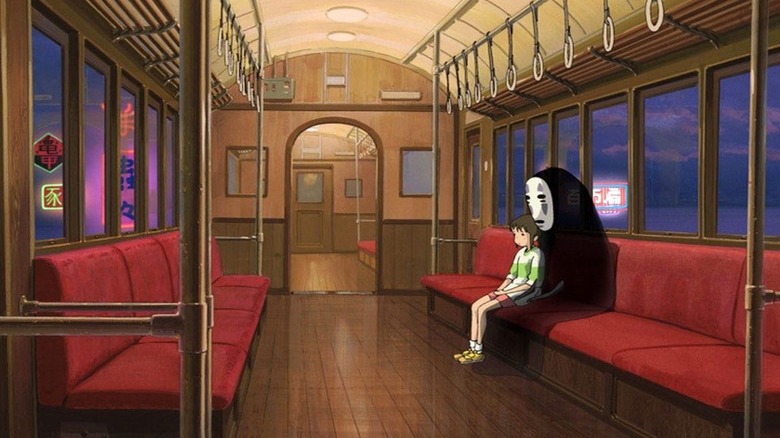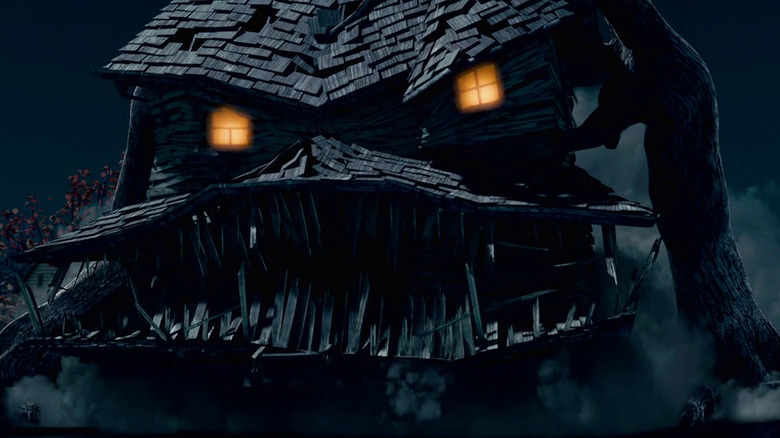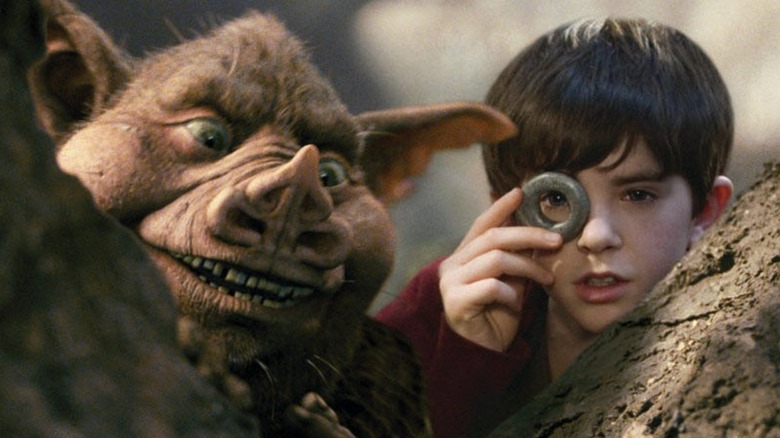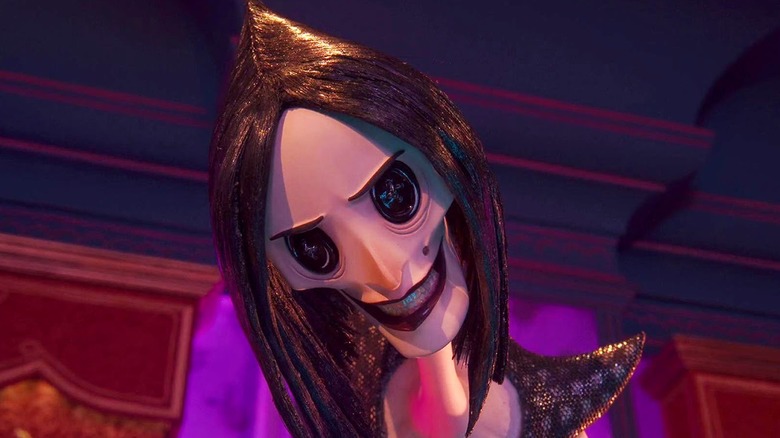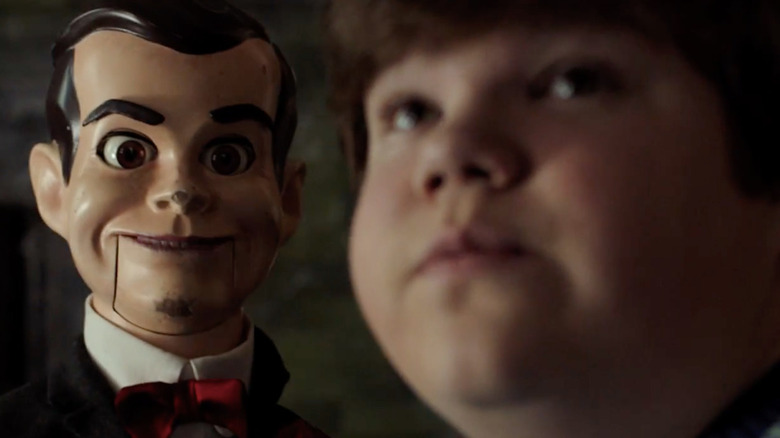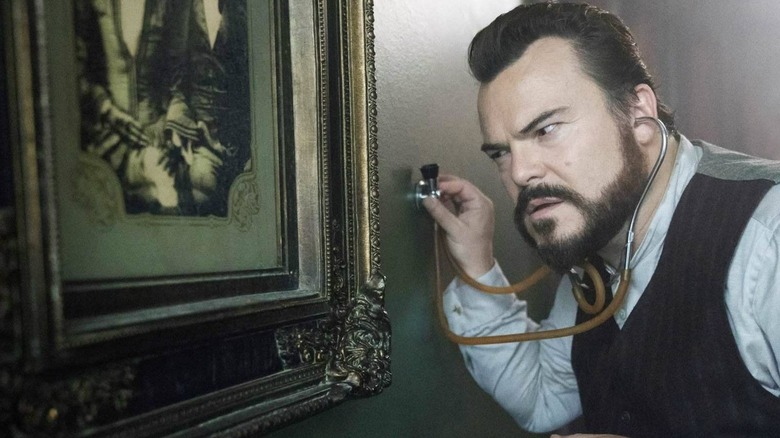14 Family Horror Films That Were Too Scary For Kids
Ask anyone about the memorable movies of their childhood, and chances are there will be at least one that has left some long-lasting trauma. We all remember those films that we watched at a tender and vulnerable age that scarred us for life. In some cases, it's because we watched "grown up" movies when we were too young; more often than not, though, it's because we watched a PG film that ended up containing something horrific, terrifying, or heinous that gave us nightmares for weeks.
Whether it's a movie that adapts a beloved (but dark) kids' book or something completely original, these films left us with indelible images that are burned into our brains. Try as we might, we still can't shake them. That's actually a normal and healthy part of growing up! And the best part is, once you're an adult, you might have children of your own who you can inflict your cinematic demons upon, starting the entire cycle anew.
Dark Crystal (1982)
We all have nostalgia for the decade we grew up in, but it's hard to argue with the fact that the '80s had a plethora of brilliant fantasy films for children. This was largely due to one man: Jim Henson. Henson's puppets could be colorful and friendly ("Sesame Street," "The Muppets") or extremely dark and disturbing, as in "The Dark Crystal" (1982) and "Labyrinth" (1986).
The vulture-like Skeksis, the villains of "The Dark Crystal," are burned into the brains of many of us who were children at the time — and in 2019, Netflix brought them back to traumatize our kids. "Do it, or the Peeper Beetle will get you" is now a frequent threat in this particular household, thanks to Netflix's prequel series, "Dark Crystal: Age of Resistance." As far as the original film goes, the Skeksis Emperor's death scene is particularly horrific.
But the Skeksis aren't the only creepy creatures in this universe. Landstriders and Garthim also provided unsettling shivers up the spine. Henson believed that a good dose of fear was an important part of children's diets, and he certainly provided a large portion of that in "The Dark Crystal."
Ghostbusters (1984)
While the classic comedy "Ghostbusters" (1984) — and its unfairly-maligned sequel — are the perfect "'safe" introductions to the world of ghosts for kids, there are a few moments that provide genuinely memorable scares. The opening scene in the basement of the New York Public Library will intrude on your thoughts every time you find yourself in a maze of stacks. Books float, record cards are violently flung into the air, and an apparition transforms from a benign elderly librarian into a shrieking skeletal monster when provoked by Bill Murray's Peter Venkman.
The sequel is arguably even scarier, with the painting of Vigo the Carpathian being genuinely creepy. Like "The Dark Crystal," "Ghostbusters" is unsettling a new generation of kids, too. The 2016 reboot provided a scene very similar to the library encounter — a seemingly benevolent spirit floats out of the basement of a historical mansion only to turn screechy and scary — and the upcoming sequel to the original films, "Ghostbusters: Afterlife," looks like it's taking a much darker and spookier approach to the source material.
Return to Oz (1985)
If you asked older millennials or members of Gen X to name the scariest movie of their childhoods, the majority would probably answer, "Return to Oz." Apparently, writer-director Walter Murch looked at the beloved 1939 classic "The Wizard of Oz" and thought, "This needs a sequel that will scar an entire generation for life." And so, he turned to the next two books in the series, "The Marvelous Land of Oz" and "Ozma of Oz," to find some real nightmare fuel.
"Return to Oz," which is actually a more faithful adaptation of L. Frank Baum's work than the original film, begins with a child being strapped down for an electroshock treatment, and only gets scarier from there. While the Wheelers are the most obvious nightmare-fuel, with their fixed-smile masks and horrible laughs, it is actually the Hall of Heads that provides the movie's true terror. Dorothy (Fairuza Balk) has been taken captive by Princess Mombi, a headless woman who keeps cabinets full of beautiful heads so that she can change them when she gets bored.
At night, Dorothy sneaks into a cabinet to get the magic powder she needs to escape, only to find a stray head that starts screaming. That wakes the rest of the disembodied heads, which also start screaming. Then the headless body of the princess starts towards Dorothy, its arms outstretched like a zombie. Absolutely bone-chilling.
The Black Cauldron (1985)
A lesser-known Disney film from the studio's pre-"Little Mermaid" slump, "The Black Cauldron" was actually the first film I saw in a cinema. I'm amazed that it didn't put me off movies for life. It starts off similarly to "The Sword in the Stone" (1963), with a Wart-like character, Taran, and his pig companion, Hen. The first traumatic moment comes when Hen is pig-napped by the Gwythaints, the hench-dragons of the evil villain, the Horned King. Then, the king (who is pretty terrifying in himself) uses the black cauldron to raise the dead and create an army of zombie-skeletons, known as the Cauldron-Born.
In fact, the original climax of "The Black Cauldron" was considered too disturbing for children and was cut and re-edited; despite this, the movie was Disney's first animated feature to be given a PG rating instead of the usual G. The imagery is still pretty dark and horrifying, especially when compared to other Disney cartoons. It's easy to see why it wasn't a hit. However, it would make an excellent companion piece to David Lowery's "The Green Knight" (which is absolutely not for children).
Beetlejuice (1988)
Tim Burton has made a career out of weirdly creepy family films that scare the hell out of kids. Only two of his movies ("Sleepy Hollow" and "Sweeney Todd") are R-rated. All of the rest are PG or PG-13, lulling unwitting parents into a false sense of security.
The first, and arguably one of the best, of Burton's feature-length spook-fests is "Beetlejuice," starring Geena Davis and Alec Baldwin as ghosts who haunt a family (which includes Catherine O'Hara and Winona Ryder) with the "help" of a mischievous spirit called Beetlejuice (a magnificent Michael Keaton).
While most of "Beetlejuice" is fairly mild horror-comedy, there are a few moments that genuinely make the audience recoil in shock. One of these is when the mild-mannered Adam and Barbara change their appearance in an effort to scare the obnoxious family living in their home. The practical make-up effects of the inhabitants of "death's waiting room" and the puppetry when Beetlejuice is transformed into a snake are also fairly creepy. Burton would go onto make "The Corpse Bride" and "Frankenweenie," proving he is still one of the best directors of family-friendly horror films.
The Witches (1990)
Roald Dahl is one of the all-time greatest children's authors precisely because of how scary many of his books are; crucially, his signature dark humor is also sprinkled liberally throughout. Dahl's most frightening book has to be "The Witches" — and when Nicolas Roeg adapted it into a film in 1990, he somehow managed to make it even worse.
The most obvious sources of trauma in the movie are the witches themselves. They look normal on the outside, but when they reveal their true natures, they become stomach-churningly monstrous. The other horrific scene involves the transformation of the boy hero and his friend into mice, which sounds like it should be cute, but manages to be comparable to the transformation in "An American Werewolf in London."
But if creeping dread is scarier to you than gruesome practical make-up, then look no further than a scene near the start of "The Witches" in which a young girl gets trapped in a painting for the rest of her life. It's mind-boggling that this movie was made for children. And if "The Witches" isn't enough, the film adaptations of Dahl's "James and the Giant Peach" (1996) and "Charlie and the Chocolate Factory" (2005) also manage to be pretty sinister, in their own ways.
The Nightmare Before Christmas (1993)
Henry Selick's "The Nightmare Before Christmas" has become a cult classic, with the tie-in merchandise still selling well to this day. Jack Skellington, the Pumpkin King, and Sally, a mannequin brought to life by a Dr. Frankenstein-like evil scientist, may be friendly, but there are plenty of background creatures that make "Nightmare" scary, especially for younger children.
The most frightening character in the film is Oogie Boogie — the scene in which he straps down and tortures Santa Claus before revealing that he's made entirely of bugs is a lot to swallow. The two-faced mayor of Halloweentown isn't easy to look at, either. The concept of Christmas gifts coming alive and attacking children is also pretty frightening; shrunken heads, Christmas-tree-eating snakes, and a demonic wreath all wreak havoc.
Although "The Nightmare Before Christmas" is popular with small children, it provides the kinds of safe scares that are important part of their development. Viewed as an adult? It's just surprisingly — and delightfully — creepy.
A Series of Unfortunate Events (2004)
Lemony Snicket's "A Series of Unfortunate Events" is a book series about the poor Baudelaire orphans — Violet, Sunny, and Klaus — who are at the mercy of their uncle Count Olaf, an actor who frequently disguises himself in an attempt to steal their inheritance. It was recently made into a Netflix television show, but before that, it was a film starring Jim Carrey as Olaf.
The books and the film are both exceedingly bleak. The gothic stylings have a lot to do with that, but it's the underlying theme — adults will always let children down and are not to be trusted — that really makes the movie so dark. While the hurricane scene at the end of the film is full of peril, it's probably the scenes in which Olaf outright abuses the children that carry the most fear. Even though the Baudelaires are exceptional children, they feel powerless and alone when mistreated by an adult with lots of influence. They've already lost their parents; they then have misery upon misery piled upon them. A fun film for the whole family!
Spirited Away (2001)
Studio Ghibli broke out into international success in 2001 with "Spirited Away." It's surprising that this was the movie that became so big, given that it's perhaps Ghibli's strangest film (and that's saying something).
"Spirited Away" starts with 10-year-old Chihiro's parents being turned into pigs in a mysterious abandoned theme park, while the matriarch of the bathhouse, the huge-headed Yubaba, magically sews Chihiro's mouth shut (a common nightmare scenario) when she tries to ask for a job. Chihiro lets a spirit called No-Face into the bathhouse, and it proceeds to start eating the workers; No-Face is black and shapeless, but has a cavernous mouth that opens up in its chest. Chihiro's friend Haku can assume both human and dragon forms — he is injured as a dragon, and there is a scene in which he is covered in bloody scratches while spewing blood from his mouth.
Like many of the movies on the list, there are surface-level scares in "Spirited Away," but it's also frightening on a deeper level. Like the Baudelaire orphans, Chihiro is separated from her parents and enslaved by a tyrannical figure. This is what's most unsettling to children.
Monster House (2006)
"Monster House" is the first Sony Pictures Imageworks film, and the animation style made it stand out, bringing some of the same uncanny valley vibes as "The Polar Express."
That's not the only reason it's scary though. As the Nebbercracker, the cranky custodian of a possessed house that sometimes comes alive and tries to eat children, Steve Buscemi delivers one of the all-time great voiceover performances. Nebbercracker is initially a scary character himself, threatening children who come near his lawn with his menacing grimace, but he eventually joins forces with the kids to try to defeat the evil abode.
The inventive ways that the house is personified are ingenious; it has a "heart," a "uvula," and various other "body parts" that the kids must defeat (or use to their advantage). While the backstory regarding the house's identity is a little rough, "Monster House" is a really scary family film that makes for a perfect Halloween watch.
The Spiderwick Chronicles (2008)
"The Spiderwick Chronicles" is based on a book series and features ogres, trolls, sprites, griffins, and more. Freddie Highmore plays twins Jared and Simon, who move into a new house, discover a magical book, and realize that the house is surrounded by magical creatures, most of whom have evil intent. The main villain is Mulgarath, a shapeshifting ogre; there's also an army of child-snatching goblins, led by a creature called Redcap.
One of the scarier scenes in the movie involves the children being chased through an underground tunnel by a beast-like troll with a forked tongue and yellow eyes. Towards the end, the house comes under attack by the goblins, who reach up from under the floorboards and grab people's ankles. Eventually, Mulgarath himself gets into the house and onto the roof. On top of all that, this is a divorce drama, and Jared is a dark, angry character who resents his mother. It's frightening, but the tumultuous time following a divorce is something that many kids will be able to relate to.
Coraline (2009)
Laika is an animation studio that thrives on making creepy stop-motion movies, including "ParaNorman," "The BoxTrolls," and "Kubo and the Two Strings." It all began, however, with perhaps the darkest Laika film of all, Henry Selick's "Coraline."
Coraline finds a secret door in her new house that leads to an alternate version of her own world where an Other Mother and Other Father live. The Other Mother in particular is one of the most sinister creations ever put into a children's film — her fixed smile, blank button eyes, and cheery countenance are reminiscent of "The Stepford Wives." The Other Mother charms Coraline with delicious feasts, but soon traps her, planning to sew buttons on Coraline's eyes, too. As the film progresses, Other Mother becomes more skeletal and spider-like, with claw-like hands that terrorize Coraline.
Laika's output has been consistently high quality, and the upcoming "Wildwood" makes it look like the studio will continue terrifying children for some time to come.
Goosebumps 2: Haunted Halloween (2018)
R. L. Stine's "Goosebumps" books have been scaring kids and teens for decades, and several different TV and film adaptations of his work have brought the chills from the page to screen. In order for the 2018 "Goosebumps" sequel to be scarier than the first installment, it only needed to focus on one thing: Slappy, a ventriloquist's dummy. And so, it does.
From "The Twilight Zone" to "Doctor Who" and even "Toy Story 4," ventriloquists' dummies have been terrorizing audiences for years. There's something inherently creepy about them, especially when it turns out that they're sentient even when a ventriloquist isn't controlling them. Slappy in "Goosebumps 2" is no exception, with his high-pitched voice, commanding ways, and possessive tendencies. Add in a scene in which the masks and costumes in a Halloween store come alive, and you have one very spooky family-oriented movie.
The House with a Clock in its Walls (2018)
Jack Black (who plays R. L. Stine in "Goosebumps 2") appeared in another scary family movie in 2018, "The House with a Clock in its Walls." Lewis (Owen Vaccaro) visits the titular house, which is owned by his Uncle Jonathan (Black), but the former owners — Isaac and Selena Izard, played by Kyle MacLachlan and Renee Elise Goldberry, respectively — have left a clock in its walls.
Lewis is coerced into raising Isaac from the dead, meaning that MacLachlan wears some great undead make-up, while shape-shifting Selena gets some gnarly transition scenes. Isaac intends to turn back time and erase humans from existence. There's a scene with vomiting pumpkins, and another one in which a baby with Jack Black's head crawls through a variety of huge cogs. Believe me, this movie is deeply weird and unsettling on a number of levels. It's also brilliant.
